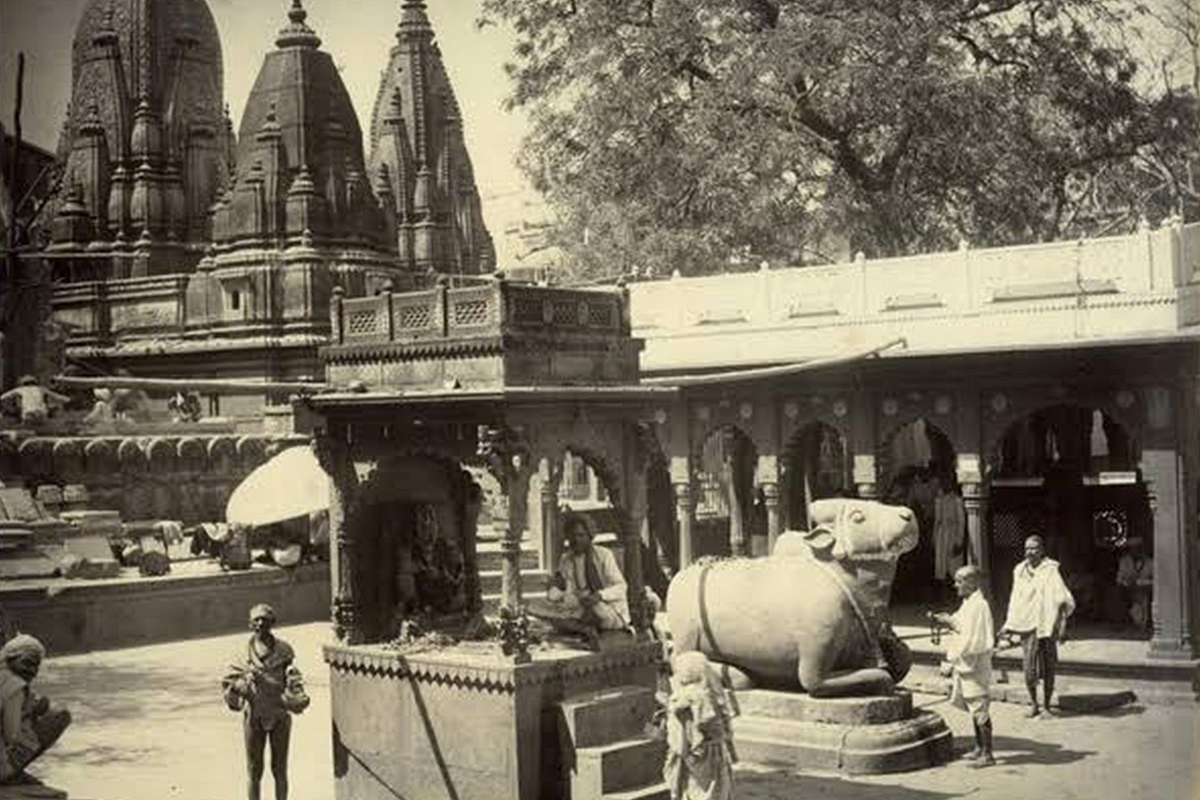Politics
Gyanvapi: Muslim Side Should Set Aside Ego And See Reason

The Nandi at Kashi Vishwanath, facing away from his Lord. (Wikimedia commons)
A Varanasi court today, 31 January, ordered that Hindus can recommence prayers in a cellar under the Gyanvapi mosque. This follows the recent submission of a report by the Archaeological Survey of India (ASI), which uncovered numerous Hindu idols, motifs, and inscriptions, and which concluded that this mosque was built on the ruins of an earlier temple.
But this is not breaking news because Hindus had been offering prayers regularly at that very cellar, in the presence of those very idols, until late 1993, when the Mulayam Singh government arbitrarily stopped prayers and banned access for Hindus to the cellar.
The simple inference is that the presence of these idols, motifs and inscriptions were public knowledge. Both the Hindus and the Muslims knew this, as did they about the copious epigraphical evidence from history, including Mughal records, which record the construction and maintenance of a mosque at this site in the 17th century.
Now, if doubters still wish to believe in, and pursue, the secular argument, that there was no temple there, they are urged to look at the remnant western wall upon which the three-domed structure was built: it still retains all the features of a medieval Hindu temple. Or, they can look at the Nandi bull who faces away from the present temple towards the three domes.
Obviously, then, this case was a non-starter. It should never have gone to the courts, and instead, the land should have been gracefully handed over to the pujaris of the Kashi Vishwanath temple. There would have been no acrimony, no bad blood.
And yet, there are those who continue to persist with a fallacious argument, bolstered by emotional rhetoric, that Muslims are being dispossessed; that they are losing their place in society.
This is pure bunk. And if the intent to continue a legal battle remains, then people need to understand that today’s verdict is a paradigm point. Just think of it from a simple standpoint first: one side says that the three domes make the structure Muslim, while a judgment allows Hindus to resume rituals and prayers in the cellar underneath.
How on earth can the religious character of a structure’s cellar be Hindu, and that of its ground floor, Muslim? It cannot. This is a patent absurdity.
Unfortunately, the very real fear is that there are those who will refuse to accept this reality and senselessly stride forth on their set path with no care for consequence. To understand this fully, let us set the legal aspects aside for a moment and ask ourselves a few simple questions:
By what moral right might the Muslim side now press forward with its claims? What is fuelling such extreme intransigence? Who is actively promoting such uncompromising positions? Why is such a stance being maintained even when it is visibly incorrect and so terribly counterproductive to society? Why is the average Muslim not asking these questions to its own community leadership?
We don’t know, and frankly, it would be impolite to speculate. But we cannot avoid the feeling that the Gyan Vapi imbroglio has been reduced to an ego battle for one side. If yes, then the counter question is: how can ego and faith coexist in the same space? They can’t, because morality demands that ego make way for reason.
That is the foundational basis of all value systems. And anyone saying otherwise is a postmodernist or a Marxian.
Why would anyone breach the limits of obstinacy? Has anyone factored in the social cost? Are the communal carnages of the past century not pointers enough?
Sadly, we know the truth. We just don’t say it bluntly enough because of a very human tendency to be politically correct, and because no one wants to hurt another’s feelings.
It is a legacy issue. At its core lies a visceral cultural separatism born of a pernicious two-nation theory, itself spawned by aristocratic fantasists. Its time is up, and in its stead has re-emerged a far older truth; one which was supressed by historical forces: that you are Muslim because you are Indian, and that you are Indian because you are Muslim. God and country. And there can be no confusion on either aspect.
Thus, today’s judgment offers welcome, and long-overdue, options for an end to an infernal obduracy which has needlessly vitiated and cleaved our sacred land for far too long. It is time for the Muslims of India to start asking the moral questions of self-appointed community leaders, and those who fuelled a baseless minority victimhood narrative for petty political gain.
Support Swarajya's 50 Ground Reports Project & Sponsor A Story
Every general election Swarajya does a 50 ground reports project.
Aimed only at serious readers and those who appreciate the nuances of political undercurrents, the project provides a sense of India's electoral landscape. As you know, these reports are produced after considerable investment of travel, time and effort on the ground.
This time too we've kicked off the project in style and have covered over 30 constituencies already. If you're someone who appreciates such work and have enjoyed our coverage please consider sponsoring a ground report for just Rs 2999 to Rs 19,999 - it goes a long way in helping us produce more quality reportage.
You can also back this project by becoming a subscriber for as little as Rs 999 - so do click on this links and choose a plan that suits you and back us.
Click below to contribute.
Latest